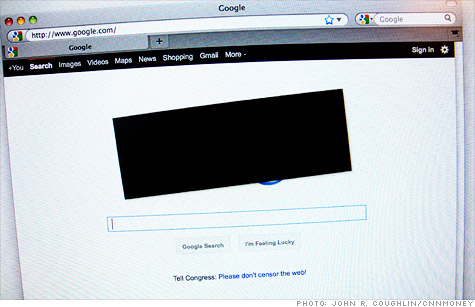Wednesday, January 18, 2012
There's a hole in the heart of the internet today
Today we are witnessing a momentous cyber-protest: the intentional self-blackout of dozens of popular U.S.-based websites and technology blogs to protest, and call public attention to, two bills currently in the U.S. Congres aimed to regulate the internet. These bills are the Stop Online Piracy Act (SOPA) in the House of Representatives and the Protect Intellectual Property Act (PIPA) in the Senate. Many in the civil society of the internet believe that, in their current form, H.R. 3261 and S.968 represent what Salon writer Andrew Leonard calls "a stark, existential threat to the core architecture of the free and open Internet."
According to Washington Post writer David Farenthold, "The idea is to cut off the channels that deliver American customers, and their money, to potential pirates. But tech companies see the laws as a dangerous overreach, objecting because, they say, the laws would add burdensome costs and new rules that would destroy the freewheeling soul of the Internet."
Major and popular web-based presence Wikipedia (a collaborative, nonprofit organization for amassing knowledge), Google's search engine (the mother of all search engines in America), blog builder site WordPress, social news site Reddit, internet classified site Craigslist, and prime technology sites Wired, Techcrunch, Mashable, Mozilla, among many others, turned off their content today to join the protest.
Will the protest cause Congressional leaders to sit up and take notice? Watch and see. Our media future will be affected by the outcome of this movement.
Media Literacies 2.1: A new class begins
Last spring, I initiated a new course at Reinhardt University, a freshman-level COM 103: Media Literacies for the 21st Century, which fulfills the composition requirement. This spring, we are back for the new season, with an enthusiastic group of students with diverse backgrounds, a slightly revamped syllabus and reading list, and a lot of eager anticipation on my part about what we will discover on this new journey together.
While the first class session was spent going over logistics of the syllabus, we had a fabulous and engaging class discussion during our second session after reading Henry Jenkins' Eight Traits of the New Media Landscape and Mark Prensky's Should a 4-year-old have an iPhone?. Jenkins' blog entry (from November 2006) discusses how the contemporary media landscape is:
Prensky's brief personal musing about the appropriateness of new technologies for young children fed into our class discussion as well, especially since a number of the class members were parents of young children themselves or had younger siblings and frequently compared their own experiences "growing up digital" with those of the youngest generation.
Today's class will be a collaborative attempt to define what media literacy is--and how the concept of literacy has necessarily changed and continues to change. Class members will share their own blog entries on this topic. I'll share here a power point I created on what I see as the most important reasons for a course like this:
While the first class session was spent going over logistics of the syllabus, we had a fabulous and engaging class discussion during our second session after reading Henry Jenkins' Eight Traits of the New Media Landscape and Mark Prensky's Should a 4-year-old have an iPhone?. Jenkins' blog entry (from November 2006) discusses how the contemporary media landscape is:
1. Innovative
2. Convergent
3. Everyday
4. Appropriative
5. Networked
6. Global
7. Generational
8. Unequal
Prensky's brief personal musing about the appropriateness of new technologies for young children fed into our class discussion as well, especially since a number of the class members were parents of young children themselves or had younger siblings and frequently compared their own experiences "growing up digital" with those of the youngest generation.
Today's class will be a collaborative attempt to define what media literacy is--and how the concept of literacy has necessarily changed and continues to change. Class members will share their own blog entries on this topic. I'll share here a power point I created on what I see as the most important reasons for a course like this:
Subscribe to:
Posts (Atom)


